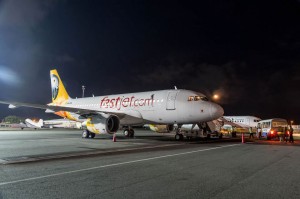
Fastjet FTZ1A (Airbus A319) shortly after landing in Dar es Salaam JNIA on its inaugural flight (Fastjet).
New ‘no frills’ airline launched
A new ‘no frills’ airline called ‘Fastjet’, modelled on the Easyjet airline which has revolutionised air travel in Europe, was launched in Africa on November 29th. The famous entrepreneur Sir Stelios Haji Ioannou, who started Easyjet, has joined with Lonrho’s airline, which flies in West Africa to establish the new group. Significantly, Fastjet chose to begin in Tanzania and Dar es Salaam airport will be its first African hub. It has already leased two planes, has 15 more on order (all Airbus A319s with a capacity for up to 156 passengers), and plans to build up to a fleet of 40.
Tanzania’s dynamic Minister of Transport, Dr Harrison Mwakyembe, spoke about the unusually speedy implementation of this vast project when he addressed a crowded AGM of the Britain Tanzania Society in London in mid November. Fastjet plans to expand from Tanzania into Kenya in 2013 and then to Ghana and Angola which are already served by the Lonrho airline. It is advertising for pilots, passenger services agents, cabin crew and crew managers and also for retail sales agents in the East African media.
‘Taking the country by storm.’
The Citizen wrote that the launch had taken the country by storm, as the airline transported 900 passengers in eight flights from Dar to Mwanza and Kilimanjaro and back on its first day! The airline’s management told investors that demand for seats on these routes far outstripped supply. In slightly over a week, Fastjet had recorded 8,000 bookings for its first two routes and the Fastjet.com website had received over 20,000 hits in its first four days. Fastjet sells air tickets as cheap as $20 (TShs 32,000) one way pre-tax, although most tickets are expected to sell at around TShs 120,000 according to Chief Executive Ed Winter. This is still significantly less than its main competitor, Precision Air, which charges about TShs 375,000 for a return ticket between Dar es Salaam and Mwanza excluding taxes. Precision Air operates three flights a day on the Dar-Mwanza route. Air Tanzania (ATCL) operates one flight a day for the same route, while Fastjet now operates two flights a day.
The London Times, in its coverage, emphasised the new airline’s mascot. In an article under the heading ‘Parrot prepares to take to the skies,’ it wrote that Sir Stelios had taken the African grey parrot as the airline’s mascot. It said that the African grey was renowned for its intelligence and therefore the perfect personification of the smart way to fly.
What will happen to Precision Air and Air Tanzania?
Precision Air, the main Tanzanian airline, has been developing rapidly and, unlike Air Tanzania, is a well managed and successful airline. It has 13 aircraft and is not paying dividends to shareholders from its profits (TShs 634 million last year) but using them instead to modernise its fleet. It seems likely to face strong competition from Fastjet on the routes it covers. However, according to the East African, it may have already adopted a strategy to protect its Tanzanian market. In November it received a new 50-seater ATR 42-800 plane, thus being the first airline to operate this new model, and is expected to receive two more as part of a three year $100 million fleet expansion plan. ATR (Aerei da Trasporto Regionale or Avions de Transport Régional) is a French-Italian aircraft construction company headquartered in Toulouse, France. The ATR’s are able to land at most of Tanzania’s airstrips many of which have hangers that cannot accommodate bigger planes.
Air Tanzania Company Ltd has had such a blighted history, exacerbated often by poor management, that many are said to be wondering if it has any future in the new age of fierce competition. But it struggles on and in October 2012, after a long gap when it was not operational, it took to the air again with its two aircraft – a 50-seater Dash SQ-300 and a leased Boeing 737-500. It also has to cope with other competition in Tanzanian airspace including planes from Link, Kenya airways, Fly 549, Air Uganda and Rwandair.
Older airlines not afraid
Immediately after the first Fastjet flights the two older airlines issued a statement which said that Fastjet was not a threat to their businesses because of the quality of their services and customer loyalty that they had cultivated over a long period.
ATCL Acting Commercial Director Mwanamvua Ngocho noted: “I don’t see any threat, though we perceive the coming of Fastjet as a challenge for us to come up with more innovative services. These are business techniques which aim at capturing human psychology without necessarily reflecting the real cost of travelling…Otherwise, we will work together without any problem,”. She also expressed doubts about the sustainability of the low budget airline, saying it would take a short time for Tanzanians to understand that the real flying cost is almost the same as other airlines especially with bags and other luggage taken into account.
Fastjet said they were not launching a price war with other operators but aimed at stimulating the market by attracting new travellers who had not been flying before. As this issue goes to the press, there are reports, as yet unconfirmed, of a possible partnership with Emirates and moves to establish a hub in South Africa (London Times 5th December).
Third air terminal for Dar
The government has called for bids from 20 international firms for the construction of a third terminal at the Julius Nyerere International Airport in Dar es Salaam as traffic increases substantially each year. The expanded airport aims to step up passenger numbers to 8 million per year. The successful bid will be announced in January 2013 and the work will be done under a public/private partnership arrangement. The airport was constructed in 1984 when passenger numbers were 1.5 million.
